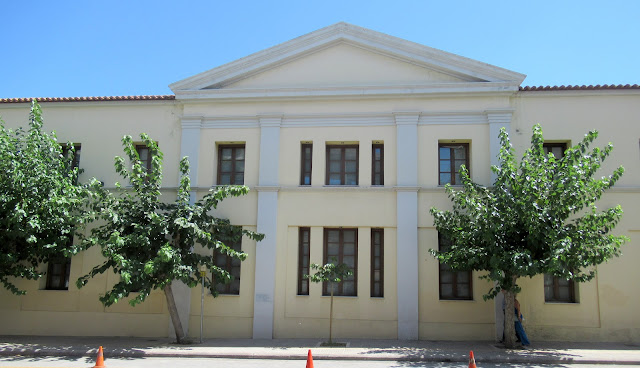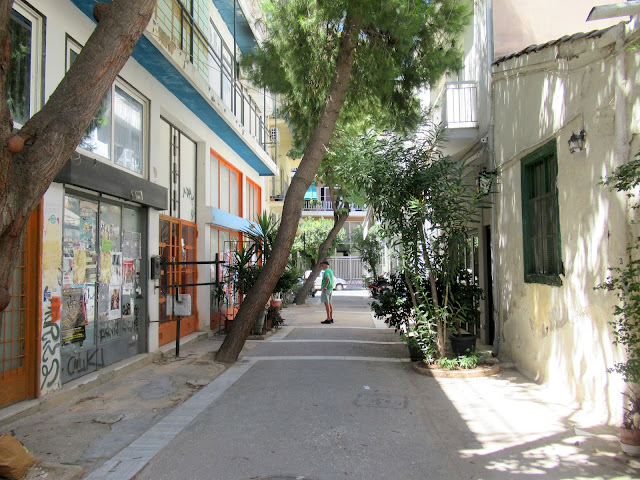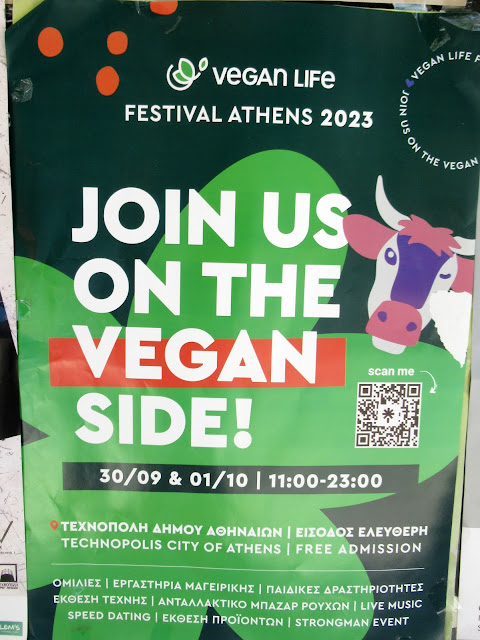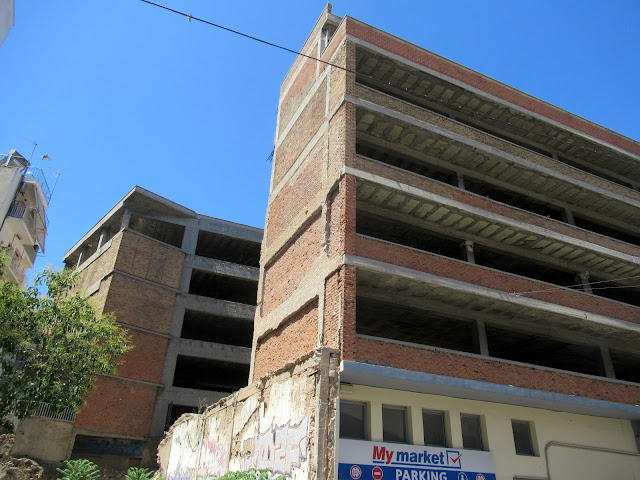Last week we visited the Municipal Gallery in Athens which is located in Metaxourgeio. We saw an exhibition on the work of new Greek artists and then decided to walk to Plaka which is a fair walk and straddles four districts.
Metazourgeio, meaning 'silk mill' , is often described as a transition neighbourhood. After a long period of abandonment in the late 20th century, the area is acquiring a reputation as an artistic and fashionable neighbourhood due to the opening of many art galleries, museums and trendy restaurants and cafes. Moreover, local efforts to beautify and invigorate the neighbourhood have reinforced a budding sense of community and artistic expression. Anonymous art pieces containing quotes and sayings in both English and Ancient Greek have begun to spring up throughout the neighbourhood. Guerilla gardening has helped to beautify the area. At the moment the area is a mix of the old or decaying and the new or trendy as you will see in this post.
This new building development which is situated opposite the gallery is a good example of the process of gentrification
it consists of many apartments
is gated and has a courtyard.

Just round the corner is this collapsing, abandoned, graffitied house - there are so many like this in this neighbourhood
Across the street from the gallery entrance is this park and square which has play areas for children, bars and
the outside seating area for a taverna
the Cockerel's Egg
We have never eaten here but it must be very popular because they have also taken over a building across the road which they have gutted
and turned it into a vast eating area.
We saw a waiter holding a stack of plates leaving the main taverna building and bringing them to the annex in preparation for the lunchtime rush
We started walking down Leonidou Street
which is a really good example of the gentrification that is going on
you see this contrast everywhere here
People sitting, chatting on the pavement - I am fairly good at recognising different languages, but did not have a clue what language they were speaking
an empty, abandoned plot (note the razor wire) with a treasure inside
iNo is a street artist based in Athens who is known for his sliced figurative depictions in oversized murals, using an aerosol fatcap technique. He has participated in world-class graffiti festivals, exhibitions and urban landscape interventions all over Europe.
There's a number of pedestrianised side streets off Leonidou which are clearly residential
In this side street
We spotted this development
this lovingly painted house
and next to it an abandoned one.
Another side street and a good example of guerilla gardening - it's beautiful
look what they've done with the shutters here
but inside it's a beautifully decorated taverna (apologies for the quality of the photo but it's the only one I took)
the waiter was setting up the tables as we were passing, ready for lunchtime.
A cafe further along
loads of posters everywhere
I couldn't work out what this one's for - maybe it's only for people in the know
I quite fancy going to that
a raki bar
and then I saw that building in the distance and had to go and have a closer look
so new, so pristine
finishing off this one has obviously been abandoned - except for the supermarket on the ground floor
the street artist who made this is very prolific all around Athens
The one on the left: 'give your city colour, the colour of change'
and the one on the right: 'when art meets the city'
There was a lot about Elvis here, so I had to go inside and see
a shop front

I am in torment - this graffiti was everywhere during the economic crisis
an interesting house
the front of it
contrast - across the road
another iNO mural
Now we are entering the Gazi district - this wide avenue, is called the Sacred Way. I presume that this is where the ancient Sacred Way was located, the road to Eleusis along which the procession moved for the Eleusinian Mysteries in ancient times.
This road is usually very busy. But, this is August, and everyone has gone away, and Athens is empty - wonderful for us. We never go away in August, we stay to enjoy the city. We go away in September when everyone has come back and the islands are less crowded
We move on, and eventually come to this gorgeous modern apartment building
We have arrived at the square in Gazi
It's where the old gas works used to be
This area became very trendy a few years ago, and was full of bars, restaurants and clubs. It was always buzzing and we used to like coming here to soak up the atmosphere, and to have some good food.
People have moved on now, and even though there are still some bars and restaurants, the district has lost that edge, that excitement
The old gas works is now a cultural and music centre
Gazi is full of interesting street art
I wanted to go and photograph some of it, but ended up only photographing what was on our way - it was very hot and we had been walking for a long time and we both wanted to sit down and have our lunch.
iNO's monumental Last Supper piece is in this area and you can see it here
The old gas works area is quite extensive

We have now entered the Kerameikos area
The old tram depot on our left
zooming in on to Lycabettus Hill which is straight ahead
On our left is the Kerameikos archaeological site. This is where the potters' quarter of the city was situated (from which the English word 'ceramic' is derived). It was also the site of an important cemetery and numerous funerary sculptures erected along the Sacred Way.
During the excavations a 2.1m tall Kouros was found. A plague pit with approximately 1,000 tombs from the 4th and 5th centuries BC were discovered. The remains found belonged to acult males and females, as well as eight children. Many consider this pit to contain victims from the Plague of Athens, which was prevalent from 430 to 428 BC.
A good view of the Acropolis on our right - again, I've zoomed in
We have reached the square in Thision, which leads to
Adrianou Street. This is the heart of tourist Athens and it's full of
street sellers,
bars and restaurants
Our destination is Kuzina. We've been coming here for years and it certainly has the best food in the area. We are very early so we've the first customers.
It's also great for people watching.



































































































